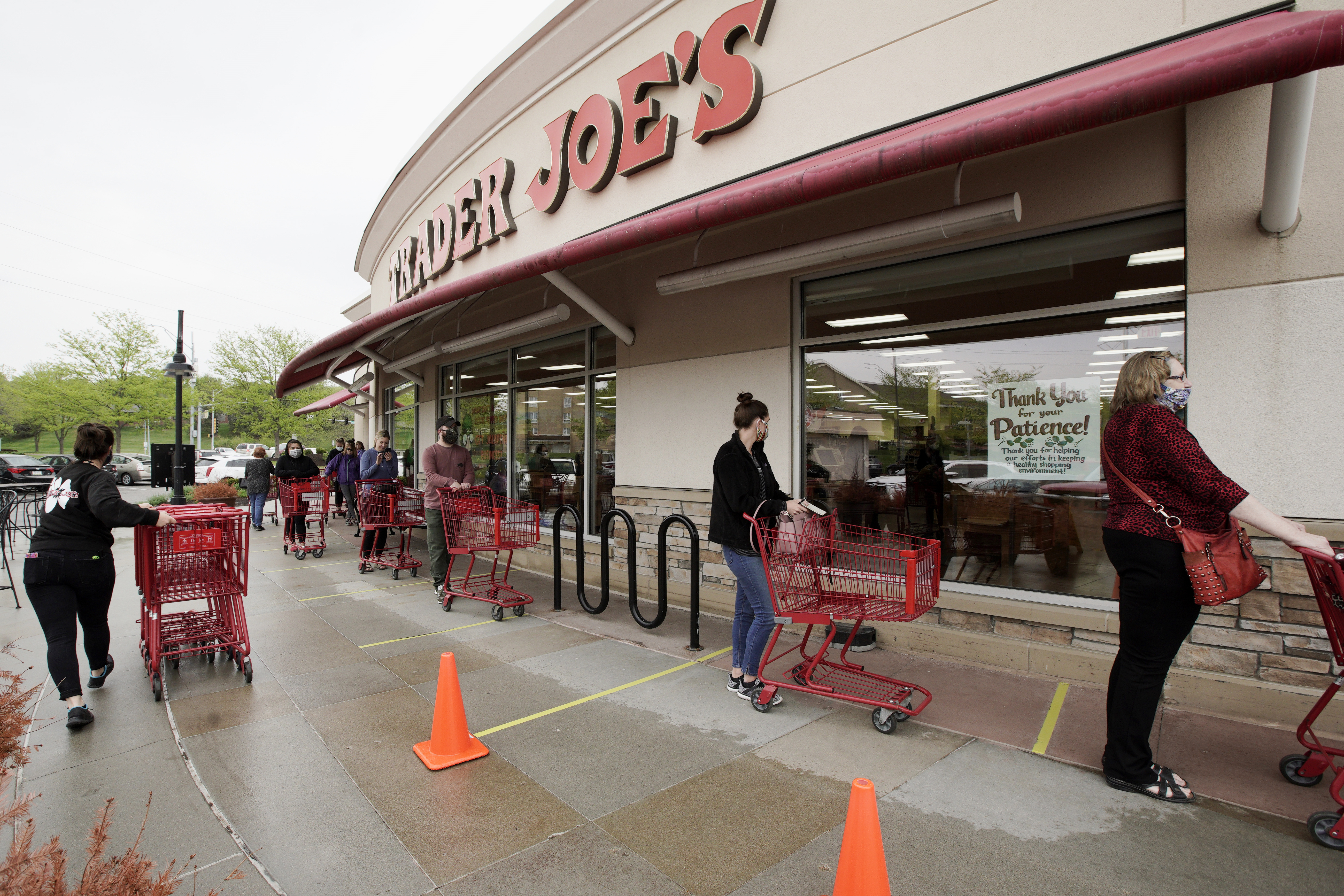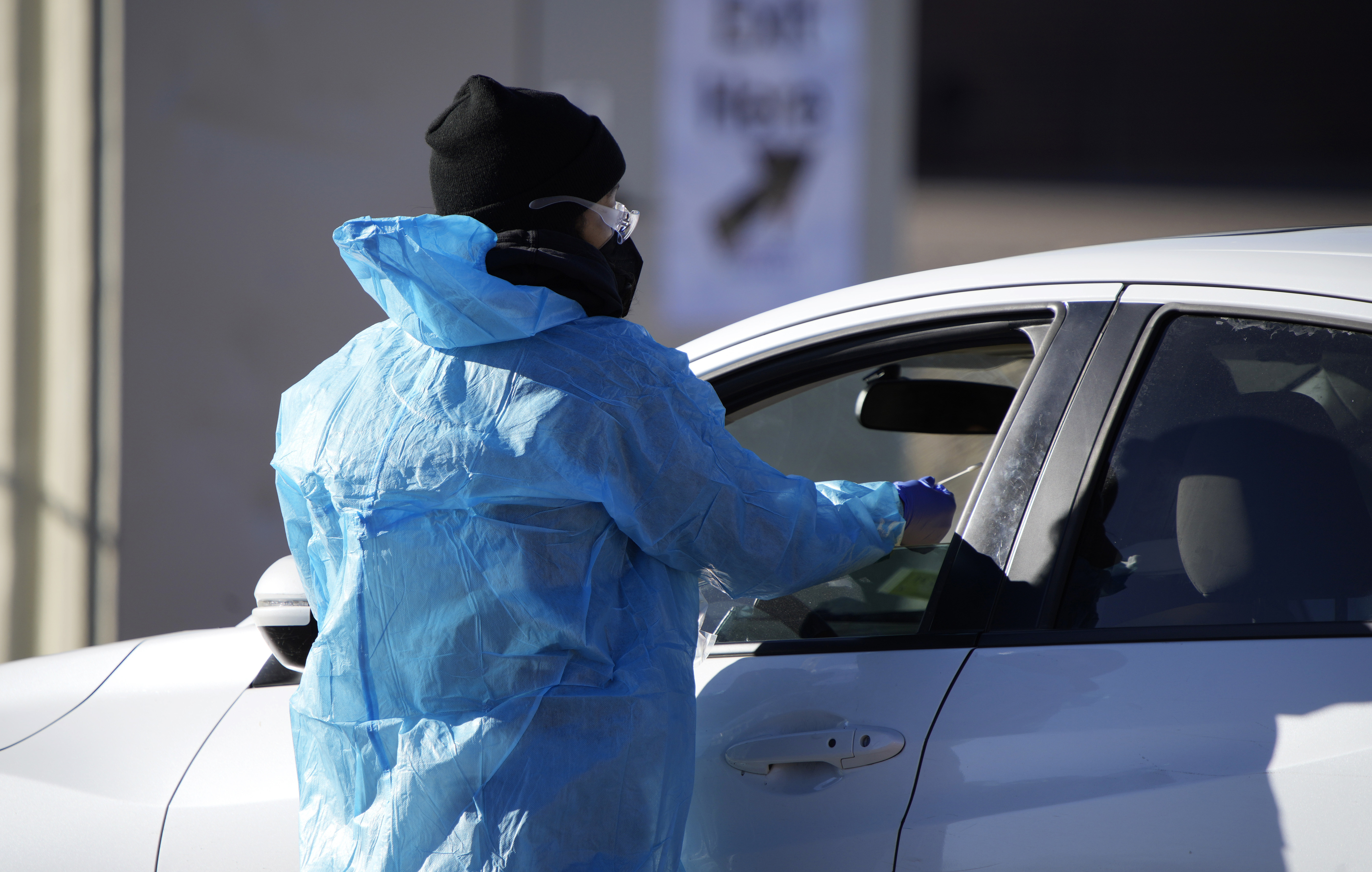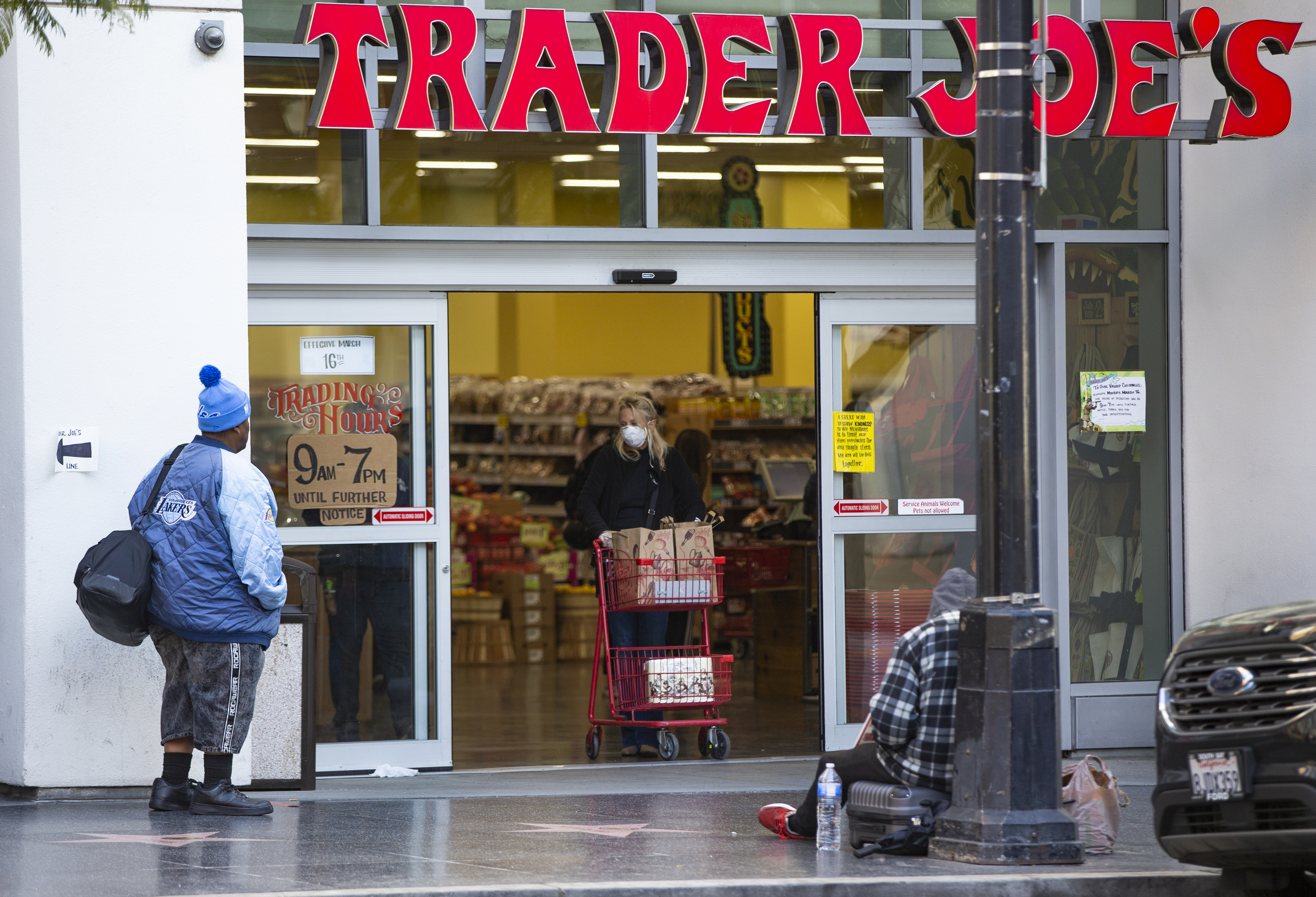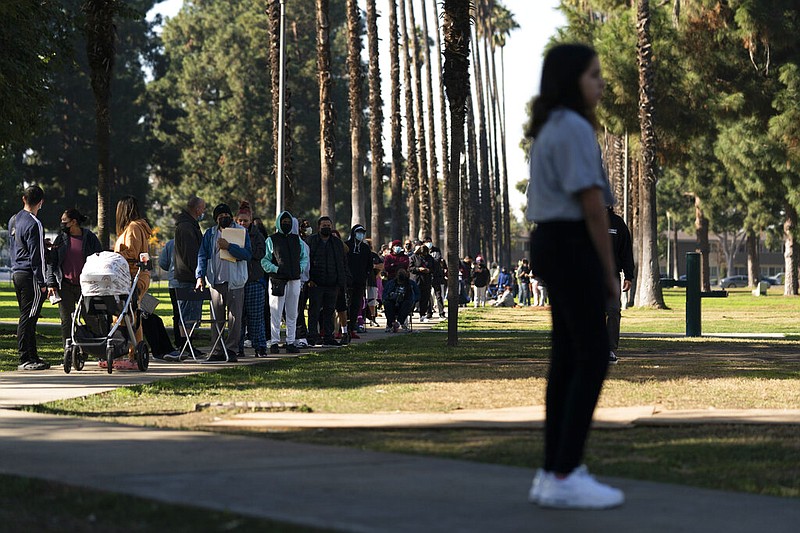As the omicron variant of covid-19 infects workers across the nation, millions of those whose jobs don't provide paid sick days are having to choose between their health and their paychecks.
Although many companies instituted more robust sick leave policies at the beginning of the pandemic, some of those have since been scaled back with the rollout of the vaccines, even though omicron has managed to infect people despite the shots. Meanwhile, the current labor shortage is adding to the pressure, with workers having to decide whether to show up to their jobs sick if they can't afford to stay home.
"It's a vicious cycle," said Daniel Schneider, professor of public policy at the Harvard Kennedy School of Government. "As staffing gets depleted because people are out sick, that means that those that are on the job have more to do and are even more reluctant to call in sick when they in turn get sick."
Low-income hourly workers are especially vulnerable. Nearly 80% of all private sector workers get at least one paid sick day, according to a national compensation survey of employee benefits conducted in March by the U.S. Bureau of Labor Statistics. But only 33% of workers whose wages are at the bottom 10% get paid sick leave, compared with 95% in the top 10% of earners.
A survey in the fall of roughly 6,600 low-wage hourly workers conducted by Harvard's Shift Project, which focuses on inequality, found that 65% of workers who had reported being sick in the previous month said they went to work anyway. That's lower than the 85% who showed up to work sick before the pandemic, but it's much higher than experts say it should be in the middle of a public health crisis.
Schneider said that figure could get worse because of omicron and the labor shortage.
In addition, Schneider noted that the share of workers with paid sick leave before the pandemic has barely budged since -- 50% before the virus's arrival versus 51% now. He further noted that many of the working poor who were surveyed don't even have $400 in emergency funds, and families will now be even more financially strapped with the expiration of the child tax credit, which had put a few hundred dollars in families' pockets every month.
The Associated Press interviewed one worker who started a job with the state of New Mexico last month and started experiencing covid-like symptoms last week. The worker, who asked not to be named because it might jeopardize the person's employment, took a day off to get tested and two more days to wait for the results.
A supervisor called and told the worker that the person will qualify for paid sick days only if the covid test turns out to be positive. If the test is negative, then the worker will have to take the days without pay, since the person hasn't accrued enough time for sick leave.
"I thought I was doing the right thing by protecting my co-workers," said the worker, who is still awaiting the results and estimates it will cost $160 per day of work missed if the test comes back negative. "Now I wish I just would've gone to work and not said anything."
Some companies are curtailing sick time that they offered earlier in the pandemic. Kroger, the country's biggest traditional grocery chain, is ending some benefits for unvaccinated salaried workers in an attempt to compel more of them to get the shots as covid-19 cases rise again. And unvaccinated workers enrolled in Kroger's health care plan will no longer be eligible to receive up to two weeks of paid emergency leave if they become infected. The previous policy was put into place last year when vaccines were unavailable.
Meanwhile, Walmart, the nation's largest retailer, is slashing pandemic-related paid leave in half -- from two weeks to one -- after the Centers for Disease Control and Prevention reduced isolation requirements for people who don't have symptoms after they test positive.
Workers in recent years have received some relief from a growing number of states. In the past decade, 14 states and the District of Columbia have passed laws or ballot measures requiring employers to provide paid sick leave, according to the National Conference of State Legislatures.
On the federal front, however, the movement has stalled. Congress passed a law in the spring of 2020 requiring most employers to provide paid sick leave for employees with covid-related illnesses. But the requirement expired Dec. 31, 2020. Congress later extended tax credits for employers that voluntarily provide paid sick leave, but the extension lapsed at the end of September, according to the U.S. Department of Labor.
In November, the U.S. House passed a version of President Joe Biden's Build Back Better plan that would require employers to provide 20 days of paid leave for employees who are sick or caring for family members. But the fate of that bill is uncertain in the Senate.
"We can't do a patchwork sort of thing. It has to be holistic. It has to be meaningful," said Josephine Kalipeni, executive director at Family Values Work, a national network of 27 state and local coalitions helping to advocate for policies, including those that support paid sick days.
The U.S. is one of only 11 countries worldwide without any federal mandate for paid sick leave, according to a 2020 study by the World Policy Analysis Center at the University of California, Los Angeles.
On the other side are small-business owners like Dawn Crawley, CEO of House Cleaning Heroes, who can't afford to pay workers when they are out sick. But Crawley is trying to help in other ways. She recently drove one cleaner, who didn't have a car, to a nearby testing site. She later bought the cleaner some medicine, orange juice and oranges.
"If they are out, I try to give them money, but at the same time my company has got to survive," Crawley said. "If the company goes under, no one has work."
 FILE - Customers observe social distancing as they wait to be allowed to shop at a Trader Joe's supermarket in Omaha, Neb., May 7, 2020. Millions of workers whose jobs don’t provide paid sick days are having to choose between their health and their paycheck as the omicron variant of COVID-19 rages across the nation. While many companies instituted more robust sick leave policies at the beginning of the pandemic, those have since been scaled back with the rollout of the vaccines, even though the omicron variant has managed to evade them. (AP Photo/Nati Harnik, File)
FILE - Customers observe social distancing as they wait to be allowed to shop at a Trader Joe's supermarket in Omaha, Neb., May 7, 2020. Millions of workers whose jobs don’t provide paid sick days are having to choose between their health and their paycheck as the omicron variant of COVID-19 rages across the nation. While many companies instituted more robust sick leave policies at the beginning of the pandemic, those have since been scaled back with the rollout of the vaccines, even though the omicron variant has managed to evade them. (AP Photo/Nati Harnik, File) FILE - A medical technician performs a nasal swab test on a motorist queued up in a line at a COVID-19 testing site near All City Stadium Dec. 30, 2021, in southeast Denver. Millions of workers whose jobs don’t provide paid sick days are having to choose between their health and their paycheck as the omicron variant of COVID-19 rages across the nation. While many companies instituted more robust sick leave policies at the beginning of the pandemic, those have since been scaled back with the rollout of the vaccines, even though the omicron variant has managed to evade them. (AP Photo/David Zalubowski, File)
FILE - A medical technician performs a nasal swab test on a motorist queued up in a line at a COVID-19 testing site near All City Stadium Dec. 30, 2021, in southeast Denver. Millions of workers whose jobs don’t provide paid sick days are having to choose between their health and their paycheck as the omicron variant of COVID-19 rages across the nation. While many companies instituted more robust sick leave policies at the beginning of the pandemic, those have since been scaled back with the rollout of the vaccines, even though the omicron variant has managed to evade them. (AP Photo/David Zalubowski, File) FILE - A person waits to enter a Trader Joe's grocery store, as a shopper leaves in the Hollywood section of Los Angeles on March 24, 2020. Millions of workers whose jobs don’t provide paid sick days are having to choose between their health and their paycheck as the omicron variant of COVID-19 rages across the nation. While many companies instituted more robust sick leave policies at the beginning of the pandemic, those have since been scaled back with the rollout of the vaccines, even though the omicron variant has managed to evade them. (AP Photo/Damian Dovarganes, File)
FILE - A person waits to enter a Trader Joe's grocery store, as a shopper leaves in the Hollywood section of Los Angeles on March 24, 2020. Millions of workers whose jobs don’t provide paid sick days are having to choose between their health and their paycheck as the omicron variant of COVID-19 rages across the nation. While many companies instituted more robust sick leave policies at the beginning of the pandemic, those have since been scaled back with the rollout of the vaccines, even though the omicron variant has managed to evade them. (AP Photo/Damian Dovarganes, File)